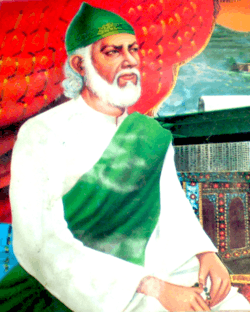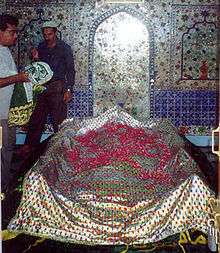Bari Imam
Shah Abdul Latif Kazmi, (Urdu شاہ عبد الطیف کاظمی المعروف سرکار بری امام ) often referred to as Barī Imām or Barī Sarkār (1617–1705), was a 17th-century Sufi ascetic from Punjab who was the most prominent Sufi of the Qadiriyya order. He is venerated as the patron saint of Islamabad, Pakistan. Born in Karsal to a family descended from Muhammad through the linage of Musa al-Kadhim, the life of Bari Imam is known "essentially through oral tradition and hagiographical booklets and celebrated in numerous songs" of Indian and Pakistani Sufism.[2] In the present day, Bari Imam is one of the most popular and widely venerated saints of Punjab.[2]
Barī Imām بری امام | |
|---|---|
 A popular local depiction of Barī Imām | |
| Mystic | |
| Born | 1617 CE (1026 AH) Choli Karsal, Punjab, Mughal Empire (now in Punjab, Pakistan)[1] |
| Died | 1705 CE (1114 AH) Noorpur, Punjab, Mughal Empire (now in Islamabad, Pakistan) |
| Venerated in | By all those Sunni Muslims who venerate saints, especially by those in the Indian subcontinent |
| Feast | 24 May (urs) |
| Patronage | Islamabad |
Tradition or genre | Qadri Tariqa, Islam |
Syed Shah Abdul Latif Kazmi Qadri Barī Imām | |
|---|---|
| Title | Imam Ul Fuqra, Shehnsha E Behro Bar, Hazrat, Sayyid, Imam, Pak Bari |
| Personal | |
| Religion | Islam |
| Region | Punjab |
| Main interest(s) | Sufism |
| Tariqa | Qadri |

Biography
Bari Imam was eight years old when his family migrated from Karsal in Chakwal District to what is now Aabpara, Islamabad in Pakistan. According to some sources, he later married and had one daughter, though both women are said to have died prematurely.[2] After their passing, Bari Imam began wandering the forests of the Hazara district in Northern Punjab, where he spent twenty-four years as an ascetic.[2]
Because Bari Imam Sarkar did not transmit any of his doctrines to writing; as such, it may be rightly presumed that he bequeathed all of his teachings orally.[3] Bari Imam went to Ghorghushti in Campbellpur (now known as Attock) where he stayed for two years to learning fiqh, hadith, logic, and other disciplines related to Islam, because at that time Ghorghushti was a great seat of Islamic learning.
Bari Imam was renowned in his own life for being an ascetic who subjected himself to great self-humiliation in the public sphere, "living among the pariahs and consciously exposing himself to the disdain of the people."[2][4]
A celebrated miracle worker, Bari Imam is also described in regional lore as one through whom God performed many marvels to convince the local people of the truth of Islam; thus, some of the most popular miracles ascribed to him are his having caused water to gush forth from rocks and his having brought back to life the dead buffaloes of a peasant who had earlier provided the saint with milk during his ten years of spiritual seclusion.[2]
Shrine
.jpg)
A silver-mirrored shrine of Bari Imam is located in Noorpur Shahan, Islamabad. It was originally built by the Mughal emperor Aurangzeb, who revered Bari Sarkar, in the 17th century. It has since been renovated many times, and is now maintained by the Government of Pakistan. Until the 1960s, the shrine was famous for its urs celebration, when the death anniversary of the saint was commemorated and which was attended by hundreds of thousands of people each year (in one particularly populous year, the attendance is said to have been 1.2 million people).[2]
On 27 May 2005, a suicide attack took place at the shrine of Imam Bari in which 20 people died and almost 70 were injured.[5][6]
Forecast about Islamabad
in 17th century when Hazrat Bari Imam resided in present day Islamabad. He forecast about a capital of Islamic republic in this area.[7]
References
- "Birth Place".
- Chaudhary, M. Azam. Imām "Barrī Imām (search results)" Check
|url=value (help). In Fleet, Kate; Krämer, Gudrun; Matringe, Denis; Nawas, John; Rowson, Everett (eds.). Encyclopaedia of Islam, THREE. Brill Online. ISSN 1873-9830. - Ghulām Shabbīr Hāshmī, Ṭulba-yi Shāh Laṭīf, Islamabad, 2010
- Jürgen Wasim Frembgen, Journey to God. Sufis and dervishes in Islam, trans. from the German by Jane Ripken, Karachi and Oxford: Oxford University Press, 2008, pp. 160-161
- "Daily Times". Daily Times.
- Newspaper, From the (14 August 2011). "Two involved in Bari Imam suicide attack arrested". DAWN.COM.
- https://www.kuna.net.kw/ArticlePrintPage.aspx?id=1271697&language=en
External links
| Wikimedia Commons has media related to Bari Imam. |